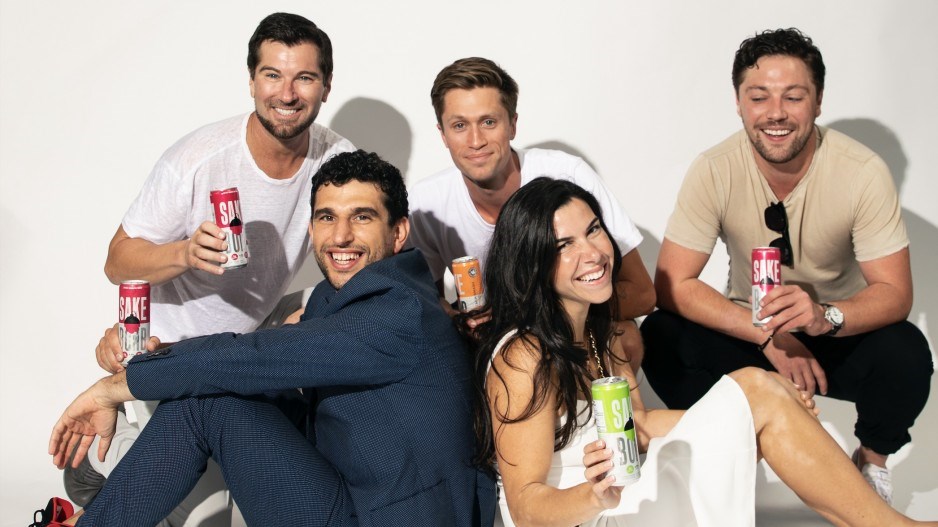Five entrepreneurs aim to disrupt B.C.'s wine-cooler market with an innovative product they call SakeBomb – a range of flavoured coolers made with the rice wine, or sake.
Sales launched a few weeks ago in approximately 80 private liquor stores, and Bomb Beverages Inc. CEO Stefana Prodea estimated to BIV that sales have exceeded $120,000.
Bomb Beverages is also looking to expand outside B.C. It has contracted Southern Glazer's Wine and Spirits to distribute products into Ontario and potentially other provinces and the U.S.
So far, all of the company's 648,000 cans of cooler have been made on contract at Surrey's Central City Brewers + Distillers.
The inspiration for the product came when Prodea moved from B.C. part-time to Austin, Texas, and met Joseph Legere, who had invested in a brewery that had bought a sake production plant in order to acquire its equipment.
Prodea knew Jerin Mece, who co-founded the sugar-free and sweetener-free Nude Vodka Soda in mid-2017, and enjoyed phenomenal success.
She suggested to Legere that there could be a market for a sake-based cooler and Mece came on board to co-found the company, alongside Prodea and Legere. Andrew Murdoch, who has experience in business transactions, also helped co-found the venture, as did Fairfax Partners Inc. principal Dan Southan-Dwyer, who helped raise capital, Prodea explained.
The group's first financing round netted $3.5 million from what Prodea described as being "dozens of angel investors."
They nominally incorporated the company in Stoney Creek, Ontario, where Prodea's parents live, but no operations are there. They plan to soon open an office near Yaletown in Vancouver, Prodea said.
The team contracted an experienced beverage producer to create recipes for the coolers, which so far include raspberry yuzu, ginger lime and peach flavours.
They also hired a part-time marketing co-ordinator and a couple people to find private stores willing to carry the product and to manage distribution. Another 10 brand ambassadors were hired to pour the product as samples to shoppers at the stores.
The rationale to enter the sector was partly because the market for what the British Columbia Liquor Distribution Branch considers "refreshment" beverages had been very strong.
Refreshment drinks saw year-over-year sales growth up to 42.5 per cent in some fiscal quarters during the pandemic – partly because of increased volume sales and partly because of an increased range of product offerings.
The most recent data, however, shows a pull-back in that category's sales.
In the three months ended June 30, British Columbians spent $122,942,628 on refreshment drinks, down $9,627,324, or more than 7.2 per cent from the $132,569,952 in the same quarter in 2021.
The niche category of wine and fruit coolers has had an even steeper decline. British Columbians spent $2,034,549 in the three months ended June 30, down $255,296, or more than 11.1 per cent, from the same quarter in 2021.
What may have prompted that slowdown is that refreshment beverages tend to sell better in hot weather. B.C. in 2022 had a cooler than average spring, whereas in 2021 the quarter included the June 2021 heat dome, which shattered temperature records and helped spark the fire that incinerated the town of Lytton.
B.C. has had role creating refreshment-beverage category
B.C. has had a role in helping invent the refreshment-beverage category, given that Okanagan-based Mark Anthony Group Inc. owner Anthony von Mandl, created Mike’s Hard Lemonade in 1996.
In 2015, von Mandl sold the Canadian and international rights for that drink to Labatt for a reported US$350 million, as part of a deal that included Palm Bay vodka coolers and Okanagan Premium ciders. BIV published this profile of von Mandl in 2014, about his rise from being virtually penniless to being the owner of a company that then generated $500 million annually.
Von Mandl in 2016 added more innovation by creating White Claw spiked spritzer, launching the drink in the U.S. and seeing it become a runaway sensation.
He had to wait until 2020 to debut the drink outside the U.S. because his 2015 agreement with Labatt included a five-year non-compete clause.
White Claw’s early 2020 Canadian release resembled “a new Apple iPhone launch, with hundreds of fans lined up around the block,” Scott Walton, president of the Mark Anthony Group’s wine and spirits division, told BIV last year.



